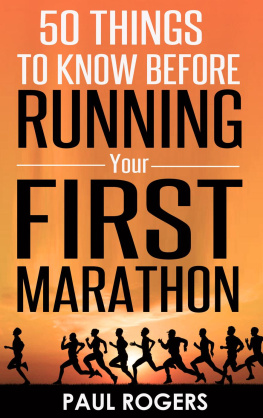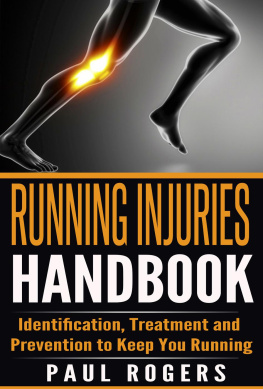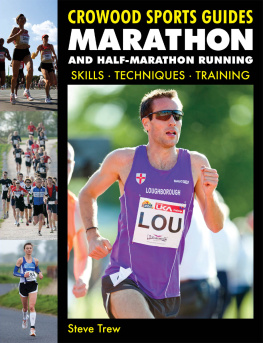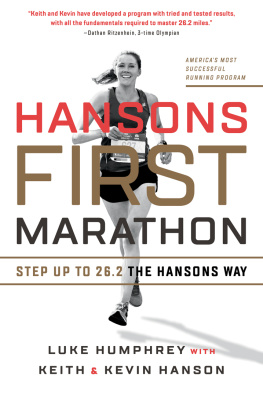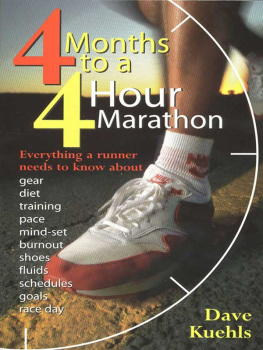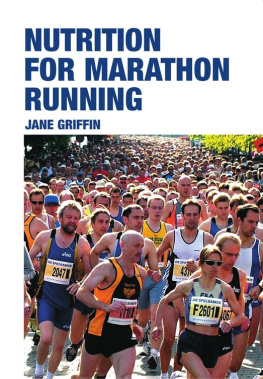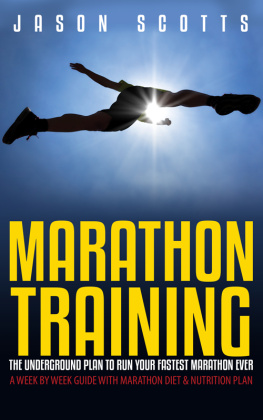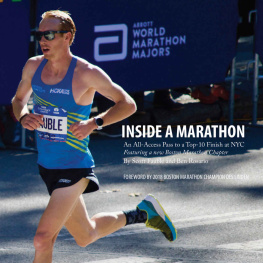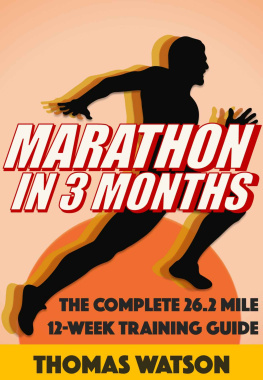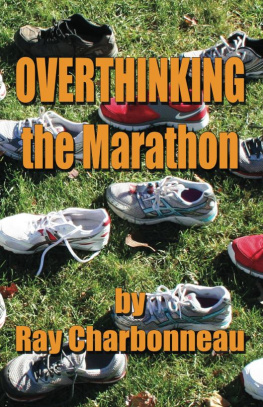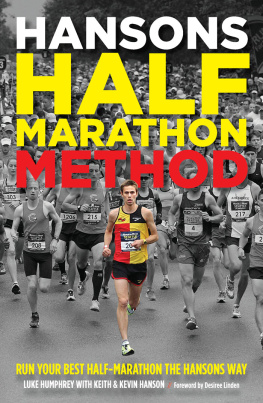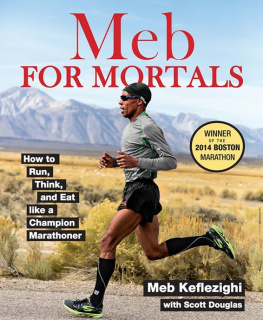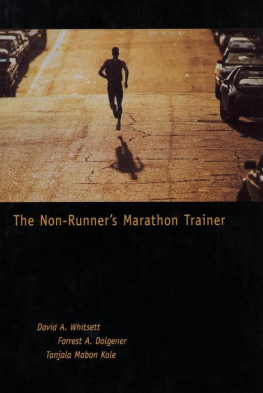Also by Paul Rogers
Beginner's Guide to Running: Training for Weight Loss, Better Health and Your First 5k
Getting Started with Social Media: A Beginners Guide to Marketing Your Brand and Influencing Your Followers
Running Injuries Handbook: Identification, Treatment and Prevention to Keep You Running
Plant Based Nutrition for Endurance Athletes: The New Science of Exploiting Organic and Raw Foods
The Athlete's Guide to Stretching: Increasing Flexibility For Inury Prevention And Rehabilitation
Carbs Are Good, Meat Is Bad: Why The Atkins And Paleo Diets Are Full Of Sh*t
Superfoods Explained: A Fact Based Analysis of Foods with Uncommonly High Nutritive Values
50 Things To Know Before Running Your First Marathon
Running On A Plant Based Diet: How Eating Unprocessed Organic Food Can Improve Athletic Performance
50 Things to Know Before Running Your First Marathon
Paul Rogers
Copyright 2015 All rights reserved.
This document is geared towards providing exact and reliable information in regard to the topic and issue covered. The publication is sold with the idea that the publisher is not required to render accounting, officially permitted, or otherwise, qualified services. If advice is necessary, legal or professional, a practiced individual in the profession should be ordered.
In no way is it legal to reproduce, duplicate, or transmit any part of this document in either electronic means or in printed format. Recording of this publication is strictly prohibited and any storage of this document is not allowed unless with written permission from the publisher. All rights reserved.
The information herein is offered for informational purposes solely, and is universal as so. The presentation of the information is without contract or any type of guarantee assurance. Before beginning any new exercise or new diet program it is recommended that you seek medical advice from your personal physician.
Table of Contents
Introduction

C ompleting a marathon will leave you with a feeling like no other. For most people, it ranks as one of the most thrilling accomplishments on their life's resume. Once you've trained for and finished a marathon, you'll have the feeling there is little in life that is outside your grasp if you are determined to grasp it.
There are two events in my life that stand out as moments of startling self-discovery. The first happened at age 32 during the birth of my first child. I thought I knew myself and understood my narrow range of emotions, until I stood weeping at the sight of my newborn son. The second happened about 10 years later when I ran my first marathon. I considered myself a mental rock, unflappable in the face of imminent crises, and then mile 18 happened.
The standard length of a marathon training program is 18 weeks. As a first time marathoner, you will have a lot of questions during those 18 weeks. The task at hand is daunting and even the best prepared marathoner will make mistakes. The myriad of decisions that you are faced with in the weeks leading up to the event will pale in comparison to the deluge of things you will need to think about on race day. The stress and rush of emotions that you will be faced with in the days leading up to the marathon do not lend themselves to sound decision making. There will be things you forget about, or don't consider at all. And having something spring up in front of you when you are in a panic approaching the starting line is not the way to start one of the most thrilling journeys of your life.
This is my list of 50 things you should know and consider before running your first marathon. I've run dozens of marathons over the years and have accumulated a checklist of sorts. Most of these things are on this list because at one time or another I've made a racing faux pas or spent needless time worrying about something that I vowed would not happen again. I hope you can benefit from my original cluelessness and more adequately enjoy your journey into the fabulous adventure that is the marathon.
Chapter 1 - Decision Time
"In running, it doesn't matter whether you come in first, in the middle of the pack, or last. You can say, 'I have finished.' There is a lot of satisfaction in that."
- Fred Lebow
R unning a marathon is not for everyone. There are a host of things to take into account before deciding if you really, REALLY want to do it. It is certainly a decision that needs to be factored based on the burden vs. benefit rule. Of course I believe the benefit far outweighs the burden, but I like running these things almost to a pathological degree, so Im sure a more level headed person would approach the decision differently. So lets have a look at the initial things to consider, starting with the obvious but still-needs-to-be-stated truth about the race.
1 Know the Distance
F irst things first: a marathon is 26.2 miles. If youve gotten to the point that youre reading a book about running marathons then hopefully you know this already. However, this is a commonly misunderstood distance and veteran marathoners have a tendency to grind their teeth when hearing the distance misrepresented. Pheidippides was the Greek courier who ran 25 miles from the battlefields near Marathon to Sparta to announce the Greek victory over Persia. And then he promptly died.
The marathon was introduced into the Olympics in 1896 as a 40 kilometer race. At the 1908 Olympics in London, the royal family asked that the race be extended so that members of the royal family could adequately see the event. This extension of the race brought the distance to 26.2 miles where it has remained ever since. Thanks a lot royal family.
2 Time Commitment
M arathon training takes a huge commitment in terms of time. This is another one of those things that you probably think you know beforehand, but wont fully appreciate until youre knee deep into it around week 10 of your training. If youre married start saving now to buy your significant other something nice (or several things nice) to make up for the amount of time you will spend away from home running. Im still amazed I made it through my first marathon without being on the receiving end of a divorce. I have since switched to doing all of my training at 4:00am before anyone else is awake so it doesnt take away from family time.
3 Choosing the Right Race
T his will mean different things to different people because marathons, like most things in life, are very much a matter of personal preference. The main things I think are important to consider are:
Logistics
S hould you do a local race versus doing a race that you need to travel to? I consider a local race to be something that is within an hour by car. Driving much further than that usually means staying at a hotel unless you are OK with dealing with that kind of commute before (and after) a race. Doing a lot of driving after a race is generally a bad idea since your legs will be sore and youre really better off being at least a little bit mobile.
Traveling to a race, either by car or plane, will obviously be more expensive. The advantage here is that you have the luxury of choosing what hotel you are staying at, meaning you have the luxury of staying as close to the start/finish line as you can afford. The downside is, again, the expense and the added hassles associated with travel.
Course
T here are generally two types of marathon courses: a loop course or a point to point course. They each have their pros and cons. A point to point course starts at one location and finishes 26.2 miles away. These technically can traverse a greater geographical area, since you are not limited to the radius of a loop, which means you have the potential to see more areas if you are in an unfamiliar location that you traveled to.

